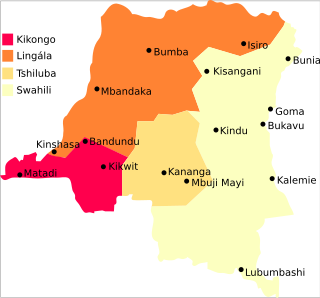Congo Swahili
| Congo Swahili | |
|---|---|
| Native to | Democratic Republic of the Congo |
| Dialects | |
| Language codes | |
| ISO 639-3 | swc |
| Glottolog | cong1236 |
 The area where Congo Swahili is spoken is highlighted in light yellow.
| |
Congo Swahili, also known as Zaïre Swahili, refers to the dialects of the Swahili language spoken in the Democratic Republic of The Congo.[1][2][3]
Overview[edit]
Congo Swahili differs greatly from Standard Swahili.[4] There is a common saying among Swahili speakers that goes: "Swahili was born in Zanzibar, grew up in Tanzania, fell sick in Kenya, died in Uganda and was buried in Congo"[5], which highlights how speakers of other dialects often find Congo Swahili incomprehensible. One of the main reasons for the differences is that, unlike Standard Swahili, Congo Swahili is strongly influenced by French, rather than Arabic.[6] It has also borrowed words from the local languages spoken in the DRC, which are not found in other varieties of Swahili.[6]
Grammar[edit]
These are some of the grammatical innovations of Congo Swahili that do not exist in Standard Swahili:[4]
- A distinction between near past and remote past.
- A distinction between near future and remote future.
- A distinction between present progressive and present habitual.
- Loss of locatives in -ni (Katanga dialect)[7]
Dialects[edit]
Glottolog recognizes 4 dialects: Katanga, Kivu, Lualaba and Ituri Kingwana.[1] The Katanga dialect is particularly noted for being extremely divergent and mutually unintelligible with other Swahili dialects[8][7] and some consider it a creole language.[7]
Publications[edit]
The Jehovah's Witnesses (Mashahidi wa Yehova) regularly publish religious articles, videos and booklets in Congo Swahili.[9] Translations of the Bible into Congo Swahili have also been published: the first partial translation of the New Testament was published in the Ituri Kingwana dialect in 1921, followed by a full translation in 1937.[10]
See also[edit]
- Swahili language
- Swahili literature
- Languages of Africa
- Languages of the Democratic Republic of the Congo
References[edit]
- ^ a b Hammarström, Harald; Forkel, Robert; Haspelmath, Martin, eds. (2017). "Congo Swahili". Glottolog 3.0. Jena, Germany: Max Planck Institute for the Science of Human History.
- ^ ISO 639-3, entry for Congo Swahili
- ^ Ethnologue, entry for Congo Swahili
- ^ a b Okamura, Toru; Kai, Masumi (2020). Indigenous Language Acquisition, Maintenance, and Loss and Current Language Policies. IGI Global. p. 58. ISBN 9781799829614.
- ^ "The genesis of Swahili language". The New Times. 2008. Retrieved June 30, 2024.
- ^ a b Nilsson, Ulf L. (2020). Swahili - A Family Chronicle. RoseDog Books. p. 249. ISBN 9781646104369.
- ^ a b c Hymes, Dell (1971). Pidginization and Creolization of Languages. International Conference On Pidgin And Creole Languages. Mona, Jamaica: Cambridge University Press. pp. 57–59.
- ^ Gibson, Michael Luke (2018-03-28). What Counts as Swahili in the Democratic Republic of Congo? Field researchers' attitudes in language-in-education research. Comparative and International Education Society (CIES) 2018 Annual Conference. Mexico City, Mexico: SIL International.
- ^ Mashahidi wa Yehova (Jehovah's Witnesses)
- ^ Mojola, Aloo Osotsi (2020). God Speaks My Language - A History of Bible Translation in East Africa. Langham Creative Projects. ISBN 9781783688241.
